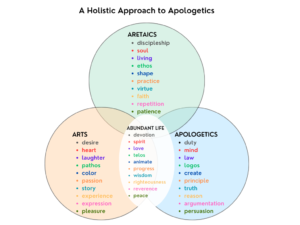I don’t know about you but I’ve been frustrated lately with the way the church has been practicing modern apologetics. From my experience Christian apologists, whom God has gifted with the raw skill set and the desire to cultivate that skill set in order to defend the faith, have been doing the best they can with what they’ve been given, but that has sadly led them to hyperfocus on rational apologetics (argumentation) at the expense of imaginative apologetics (arts), and that’s saying nothing about the great divorce between apologetics and character formation (aretaics).
From the chrysalis of Christianity, the art of story-telling and self-expression has grown over thousands of years to the cinematic peaks of Hollywood and the modern music industry. The truth is that we crave the arts–in its multifaceted form–more today than ever before, especially due to the infinitesimal opportunities to express ourselves in the current cultural climate of post-postmodernity.
Ethics, however, has done the exact opposite. It’s taken a downward spiral these last few hundred years, partially due to the Western rise of personal desire with its emphasis on pleasure (hedonism) and the decline of duty or responsibility for one’s actions (deontology). We have eclipsed wisdom–the right way to live our lives–with knowledge (mere information to get what we want). Wisdom is viewed today more as a luxury than a necessity. Sadly, our culture is morally decomposing at an exponential rate. But it has not always been this way.
In the early church, the kingdom of God was synonymous with discipleship. Now, we as Christians as a whole, seldomly put into practice the wise words of our spiritual mentors, if we in fact have mentors with whom we meet with on a regular basis, men and women who care enough to ask us the tough questions so we can get to the reality of whether or not we are forming our souls to the character of our ultimate spiritual mentor, Christ.
Aretaics and arts were never meant to exist separately from one another. They were meant to overlap (not just on paper but in our own lives) and to be an example or an apologetic for others to witness.
Let’s live out our faith holistically so we, and those around us, can enjoy the overflow of creatively interconnecting these biblical disciplines in what Christ calls “the abundant life” (John 10:10).
Below is a venn diagram I’ve created to help illustrate what I’ve been talking about. Hopefully, this will assist in starting conversations and asking hard questions about the intersectionality of things like story, morality and religion, which I’m really excited about happening in my lifetime.
